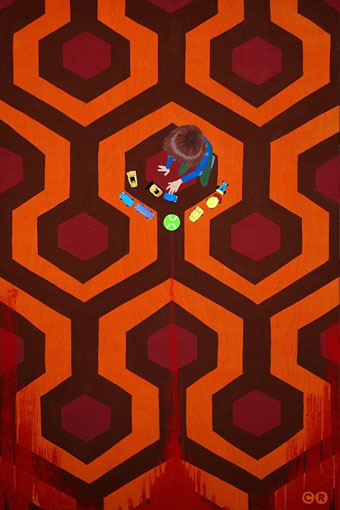Since premiering at Sundance, Rodney Ascher‘s Room 237 has been winding its way through the global festival circuit all year. Most of the reviews that follow have been gleaned from its stopover in Toronto, and in a couple of weeks, they’ll segue into a fresh batch from the New York Film Festival.
Meantime, Ascher and his film are in Austin for Fantastic Fest, and we turn first to eFilmCritic‘s Peter Sobczynski for an overall orientation: “Although it was roundly disdained upon its original release in 1980 as an inferior adaptation of a superior novel, Stanley Kubrick’s screen version of Stephen King’s The Shining has seen its reputation grow over the years to the point where it is now not just regularly regarded as one of the greatest horror films ever made but a permanent part of the cultural firmament. Perhaps not surprisingly, considering both its popularity and the enigmatic nature of the project itself, people have been thoroughly scouring every frame of the film in the hopes of unlocking the clues that they are convinced that Kubrick hid in plain sight and discovering what it was really about. The much-discussed and absolutely fascinating documentary by Rodney Ascher gives voice to five such obsessives as they take viewers through every conceivable aspect of the film, ranging from the contents of the hotel pantry to the make of the typewriter used by Jack Nicholson to an apparent continuity error involving a chair.”
Noel Murray at the AV Club: “The Shining can’t be a coded confession by Kubrick that he helped fake the moon landing and a metaphor for the Holocaust and a symbolic representation of the American government’s slaughter of the Indians and a subliminal-message-filled exploration of deviant human sexuality and a complicated structuralist film that’s essentially 2001 in reverse. Or can it? Room 237 joins the ranks of classic documentaries like Rock Hudson’s Home Movies and Los Angeles Plays Itself that encourage cineastes to take a closer look at the secret messages that movies send, and to ask whether they’re intended or not—or whether it matters. What makes Room 237 work so well is that Ascher shows the same Shining clips over and over, with different interpretations, letting only the voices of the theorists and the images from the film (plus a few other relevant movies) tell the story. The effect is intense: a deep dive into the rabbit hole of semiotics, which leaves viewers more alert to what’s really on the screen.”
“I saw The Shining at the time of its release and have always thought of it as another visually pompous but boring and insubstantial Kubrick movie, a failure as a genre film and not interesting as a thesis about whatever’s going on underneath its plot,” writes Quintín for Cinema Scope. “And suddenly, I was enlightened. I’m not exactly sure why or in what respect, but I came out of Room 237 admiring Kubrick, regarding The Shining as a sort of masterpiece, and reconsidering my phobia towards interpretation…. Viewing a film is becoming more and more inseparable from returning to it and playing it endlessly. What’s even stranger for the old-critic mentality is that meaning is no longer fixed as a result. Thanks to technology, a film is not the same object as it was in the past, and the game of meaning attains its true goal, which is not to locate a set of equivalences between scenes and the secret that lies beyond them but, on the contrary, to liberate ambiguity and contradiction…. I watched Room 237 twice. In between, I watched The Shining on my computer and rather loved it, found it scary and intriguing. Its obvious weirdness (which so strongly anticipates David Lynch), those ambiguities, the unsolved side mysteries and plot holes, all of which made me angry 30 years ago, added to a pleasure that Room 237 undoubtedly paved the way for. Among other things, thanks to Room 237, I saw how close the film was to Eyes Wide Shut.” Seriously, you’ve got to read that review in full.
Jonathan Rosenbaum, though, finds Room 237 to be “at once entertaining and reprehensible.” It “refuses to make any distinctions between interpretations that are semi-plausible or psychotic, conceivable or ridiculous, implying that they’re all just ‘film criticism’ and because everyone is a film critic nowadays, they all deserve to be treated with equal amounts of respect and/or mockery (assuming that one can distinguish between the two)—that is, uncritically and derisively, with irony as the perpetual escape hatch…. Yet one could argue that one reason why we no longer have much journalism worthy of the name is the catastrophic fantasy that impartiality is either possible or desirable. If, in fact, more Americans today believe that Obama would end Medicare while Romney would preserve it, as some polls actually claim, this is largely thanks to the expedient myth that one opinion is just as good or as worth preserving as any other—which often means that the one with the most advertising dollars triumphs. Which is another way of saying that we need criticism in order to have journalism, and the reductive treatment of all critical voices as equal is the surest way of nullifying all criticism and therefore all journalism as well.”
“If nothing else, the film encourages close, personal readings and confronts art on an obsessive, cosmopolitan level,” writes Jordan Cronk at the House Next Door. And “it adds further intrigue to a work that already held the ability to awe and unsettle. Room 237, then, is more companion piece than standalone work, but it’s rare that such an complementary creation could be so much fun.”
“The takeaway isn’t just that The Shining is a rich text, but that its richness is a paragon of the magically subjective experience that all great cinema provides,” writes indieWIRE‘s Eric Kohn. For James Marsh (Twitch), Room 237 is one “a hilarious, mind-blowing, one-of-a-kind experience.”
Meantime, IFC Midnight has picked up distribution rights and, reporting for indieWIRE, Jason Guerrasio points out that “Ascher has no choice but to go down the rabbit hole of proving that the footage he’s used falls under fair use, which would prevent him from having to pay hefty licensing fees to [Warner Bros., which owns The Shining] or being sued for showing the film in theaters.” Guerrasio pokes around a bit in that rabbit hole, talking with lawyers about the Best Practices in Fair Use Doctrine of 2005 and with Kirby Dick about the hurdles he overcame when he made This Film Is Not Yet Rated (2006).
Update, 9/27: “Watching the movie I was constantly debating with myself: is this a work of film criticism? Or is it a critique of film criticism?” Criticwire‘s Matt Singer puts that and several other questions to Rodney Ascher.
Update, 9/30: “Room 237 testifies to the empowerment of the viewer by video technology,” writes Steve Erickson in Gay City News: “the repeat viewing, as well as the frame-by-frame analysis its subjects have engaged in, would have been impossible before the advent of home video. It’s up to us to decide if this is a positive step.”
Update, 10/7:
Update, 10/8: “Rosenbaum’s reservations are not entirely unfounded,” finds Nathan Rogers-Hancock at Cinespect, where he notes that “the observations of Ascher’s experts… are united both in their literal-mindedness and in their absolute devotion to their beliefs, and attachment to the film itself. Ascher, whose earlier work plunged unreservedly into smugness, makes no such commitment, risks nothing of himself. But such reservations are no more than reservations; the critic who tries to make moralistic judgments upon initial release will most likely look like a fool once time for reflection has arrived…. That Ascher manages to reframe and celebrate a film like Kubrick’s, which has become familiar to the point of parody for many viewers, while still avoiding the trap of reverence is something to applaud. To paraphrase Brecht, a theater that can’t be laughed in is a theater to be laughed at.”
Update, 10/10: “There are at least two problems with Room 237’s depiction of criticism,” argues Girish Shambu. “First, it is an activity that often comes across as outré, freakish or crackpot…. Second, and more important, film criticism here is a largely apolitical, hermetic activity that moves inwards, carving out a self-enclosed space, the space of a cognitive puzzle, a puzzle to be solved based on clues well hidden by a genius filmmaker…. [W]hen Room 237 represents film analysis in a manner that treats it as little more than a clever puzzle-solving exercise, it gives no hint as to the social value and political/aesthetic worth of this public activity. It never intuits what is truly at stake in the activity of paying close, analytical attention to films.”
Updates, 10/16: “A single throwaway line acknowledging poststructural theory (and, in particular, its principal tenet of validating meanings unintended by a work’s author) is a crucial inclusion,” suggests Calum Marsh in Reverse Shot: “it at least lends the film a sense of self-awareness—but it feels like little more than deferential lip service paid to those with a background in such things. Insofar as it provides such a wide range of dense, contradictory readings of one particular film, each exhaustively considered and compelling in its own way, Room 237 could have very thoughtfully interrogated the practice of privileging intended meaning over purely speculative or projected ones by speaking directly to the issue; the raw material would have been ideal fodder for confronting our preconceptions about close reading and the pursuit of a kind of truth in art.”
And from Sundance NOW:
Update, 10/21: The Guardian‘s Xan Brooks calls up Jan Harlan, Kubrick’s brother-in-law and executive producer on The Shining, who tells him that Kubrick “wanted [even] more ambiguity. If he was going to make a film about ghosts, he wanted it to be ghostly from the very first to the very last. The set was very deliberately built to be offbeat and off the track, so that the huge ballroom would never actually fit inside. The audience is deliberately made to not know where they’re going. People say The Shining doesn’t make sense. Well spotted! It’s a ghost movie. It’s not supposed to make sense.”
Update, 10/27: “Kubrick was himself a detail obsessive, and that fact makes these theories very seductive,” writes the Guardian‘s Peter Bradshaw, who, like the Telegraph‘s Marc Lee, gives Room 237 four out of five stars. More from Michael Leader (Little White Lies), John Patterson (Guardian), and Mark Stafford (Electric Sheep).
Toronto and NYFF 2012: guides to the coverage of the coverage. For news and tips throughout the day every day, follow @KeyframeDaily on Twitter and/or the RSS feed. Get Keyframe Daily in your inbox by signing in at fandor.com/daily.





